We may not have the course you’re looking for. If you enquire or give us a call on +44 1344 203999 and speak to our training experts, we may still be able to help with your training requirements.
We ensure quality, budget-alignment, and timely delivery by our expert instructors.

In the ever-evolving world of technology, the role of a DevOps Engineer has become increasingly crucial. But who exactly is a DevOps Engineer, and why is their role so vital? Are you curious about the responsibilities, skills, and career prospects of a DevOps Engineer? This Devops Guide will answer all your questions , examining the fascinating world of DevOps.
Explore this blog to become a DevOps Engineer, covering essential skills, roles, and salary trends. Dive into the dynamic world of DevOps and discover why this career is both challenging and rewarding. Read ahead to learn more!
Table of Contents
1) Who is a DevOps Engineer?
2) How to become a DevOps Engineer?
3) Responsibilities of DevOps Engineers
4) Roles of DevOps Engineers
5) Salary of DevOps Engineers
6) Conclusion
Who is a DevOps Engineer?
A DevOps Engineer is an IT generalist with extensive experience in development and operations, with a focus on DevOps toolchains, system administration, infrastructure management, and coding. Since DevOps Engineers collaborate across the organisation to foster a more collaborative environment, they should also have strong interpersonal skills.
DevOps Engineers must be well-versed in standard system architecture, provisioning, and administration. They also need to be comfortable with source control, delivering and receiving code reviews, creating unit tests, and Agile principles.
How to become a DevOps Engineer?
DevOps Engineers need a bachelor's degree, some practical experience, and a love of writing code and troubleshooting development issues. Discussed below are step-by-step instructions on how to become a DevOps engineer. Follow this DevOps roadmap to get a clearer picture:
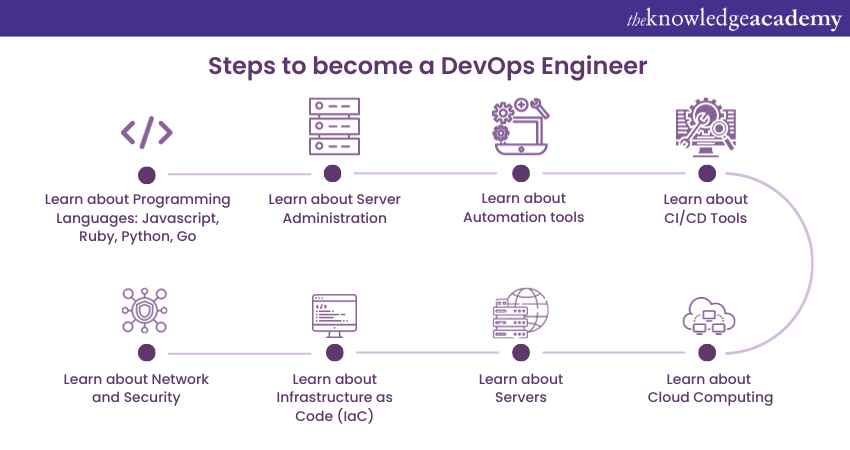
Step 1: Learn coding
Coding expertise is a prerequisite for becoming a DevOps Engineer. You can learn the foundation of programming through online coding courses and boot camps, both free and paid, that are readily available. Start by familiarising yourself with common coding languages such as:
a) JavaScript
b) HTML
c) CSS
d) C++
e) Python
In addition to these languages, gaining proficiency in data analytics can help you understand and practise more intricate concepts like data structures, which are often included in programming. Here are some key topics to focus on:
a) Data structures
b) Algorithms
c) Databases and SQL
d) Object-Oriented Programming Languages (OOP)
e) Integrated Development Environments (IDEs)
f) Web development
g) Cloud Computing
h) Containers
i) Text editors
j) Version control systems (e.g., Git)
k) CI/CD tools
Step 2: Understand Operating Systems
Additionally, you should familiarise yourself with the common Operating Systems (OS), such as Windows, Linux, macOS, Android, and iOS. Knowing OS involves both hardware and standard features like:
a) Main memory management
b) Secondary storage management
c) Security management
d) Processing management
e) File management
f) Network management
g) Command interpreter system
h) I/O device management
i) Kernel architecture
j) System calls and API
Step 3: Earn a bachelor's degree
Employers frequently consider a DevOps Engineer's abilities over their educational background. However, but most employers still respect a degree because it demonstrates that you have a well-rounded educational background. The following are beneficial bachelor's degrees for DevOps Engineers:
a) Software design
b) Software engineering
c) Information Technology
d) Computer programming
Step 4: Get certified
In order to showcase their abilities to prospective employers, DevOps Engineers should obtain one or more certifications. There's no single DevOps certification that applies to all. Popular certifications include:
a) Docker Certified Associate (DCA)
b) Certified Kubernetes Administrator (CKA)
c) Architecting with Google Cloud Platform
d) AWS Certified DevOps Engineer — Professional
Step 5: Get hands-on experience in DevOps Engineering
You will need some experience under your belt in order to become a DevOps Engineer. Working with developers to observe what they're doing is one way to achieve this. You can get ready for DevOps roles by being aware of current processes.
If you work as a techie, you can also begin writing code to automate current procedures. As an alternative, obtaining an internship in development, operations, or DevOps can assist you in gaining practical experience.
Additional tips for obtaining internships and other hands-on training includes the following:
a) Make a GitHub account so you can store all of your coding projects there and include a link to it on your resume.
b) Another way to obtain experience and discover DevOps opportunities is to make connections with other DevOps professionals.
Step 6: Start applying for DevOps Engineer jobs
Most professionals are qualified for DevOps Engineer positions after obtaining a degree, certifications, and experience. It's time to demonstrate your expertise to the real world. When applying for DevOps Engineering jobs, you'll need a strong portfolio that showcases your technical expertise, licenses, and degrees. Previous work experience and networking connections can help you find DevOps engineer jobs quickly.
Sign up for our in-depth Certified DevOps Professional (CDOP) today and achieve DevOps certification!
Responsibilities of DevOps Engineers
DevOps Engineers generally manage operations across various departments. The following are the key responsibilities of a DevOps Engineer:
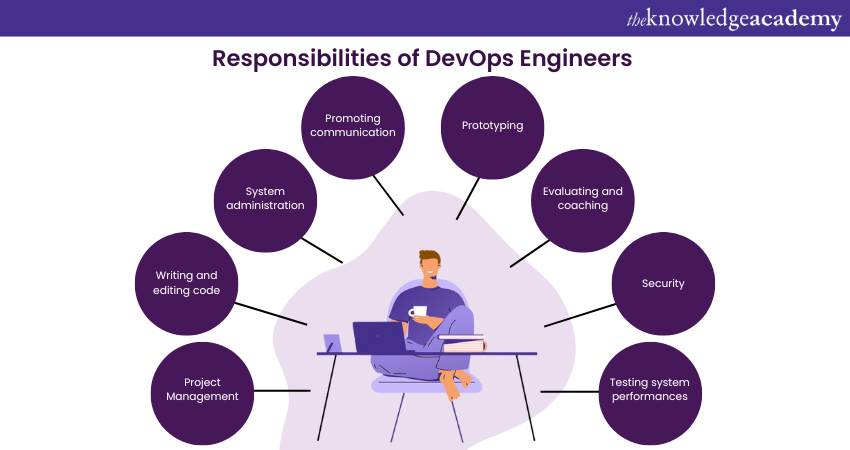
1) Project Management: DevOps Engineers create strategic plans utilised in implementing IT projects (Devops roadmap). The project risks, benefits, costs and operational expectations are all assessed before developing the project plans.
2) Writing and editing code: DevOps Engineers typically spend a portion of their time writing and improving code. They also find ways to improve task automation and resolve concerns with the application interface. A DevOps Engineer must be proficient with programming languages, although they may delegate coding tasks to other Software Developers.
3) System administration: DevOps Engineers maintain the smooth operation of computer servers, networks, and clouds by administering the system. They also perform other maintenance tasks such as software updates, system configurations, data backups, etc. Furthermore, DevOps also identifies vulnerabilities and anomalies through system log reviews.
4) Promoting communication: DevOps Engineers help facilitate communication amongst business users, IT operations and software development teams. Their involvement as a liaison helps ensure high-velocity deliveries of applications. DevOps Engineers need to track the communication of their team members across various channels. This ensures a smooth project workflow.
5) Prototyping: DevOps Engineers develop prototypes of the various software tools, then present them to the developer team for implementation. The prototypes are developed to address specific problems and to define the relevant system interfaces.
6) Evaluating and coaching: DevOps Engineers on a senior level are required to assess their team’s performance. In addition to automating IT systems, they also identify the training requirements of their staff in programming and soft skills such as leadership and communication. The Engineers essentially help in filling the skill gaps for the team members.
7) Security: DevOps Engineers especially ensure the safety of the company’s data by integrating security measures into the software processes. They must also make sure the updates do not produce any vulnerabilities. The prompt identification and address of system breaches are two essential priorities of DevOps since they utilise significant amounts of automation in their regular work.
8) Testing system performances: The creation and running of software application tests are pivotal to the Quality Assurance (QA) process handled by DevOps Engineers. Their assessment of every programming method is necessary for context with the corresponding task. DevOps Engineers help identify infrastructure flaws and then write the necessary code to resolve the problem. Otherwise, they can delegate the work to Software Engineers to find a solution.
Learn to automate deployment and manage cloud-native applications using Kubernetes. Dissect its intricacies with our Kubernetes Training!
The roles of DevOps Engineers
DevOps Engineers aim to change the traditional process of putting the burden of the code’s responsibility on the operations team. By understanding the roles and responsibilities of a DevOps Engineer, the handover from the development team to the operations team would leave room for minimal guidance from the development team. This typically resulted in a pile-up of backlogs and strained the process of building trust and collaboration between the development and operations teams.
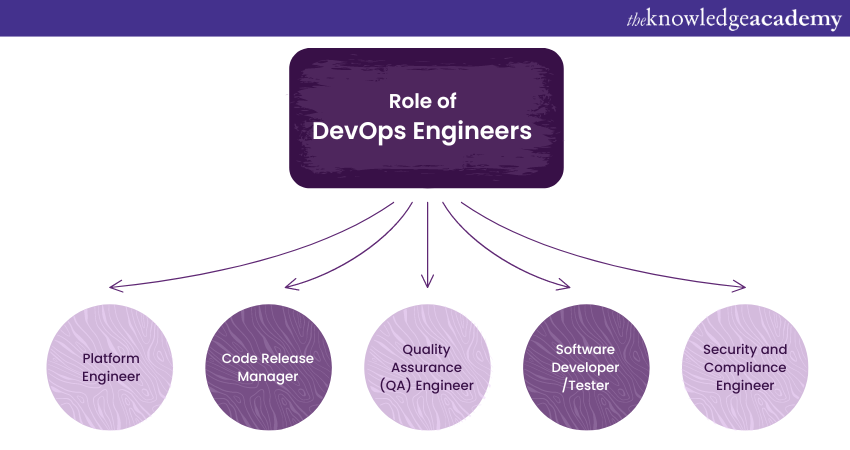
The DevOps Engineers come into the picture to introduce a more streamlined workflow of DevOps Stages leading to higher quality products and marketing time. Improving productivity results in fewer problems that need to be solved over time, allowing the team to invest more time in innovating the current products.
Let’s discuss the five DevOps Engineer job roles:
A) Platform Engineer: The Platform Engineer is seen as a change agent who owns and delivers the change in the DevOps culture. They build and maintain the DevOps team identity.
The duties of the Platform Engineer are:
1) Platform engineers create and maintain the infrastructure that applications run on. They choose hardware, configure networking, and establish security policies.
2) They track system activity and trends to prevent issues and ensure smooth operation.
3) Platform engineers write code to handle tasks like user authentication and database management.
4) When problems arise, platform engineers troubleshoot and fix issues promptly.
5) They stay stay on loop about the latest developments in technology and adapt their practices accordingly.
6) Platform engineers collaborate with developers and senior management to meet application needs.
B) Code Release Manager: The Code Release Manager role of the DevOps team holds the role of a Project Manager. The Release Manager needs proficiency in their technical knowledge and expertise to maintain the product’s development and quality delivery. More importantly, the Code Release Manager of the DevOps team needs to understand how to leverage the Agile methodologies implemented in the team’s software lifecycle. If you're preparing for a cloud engineering or DevOps role, reviewing Cloud Engineer Interview Questions can help you understand the key skills and technical knowledge required to succeed in positions like this.
The key duties of the Code Release Manager involve the following:
1) Coordinating with various departments to plan and schedule delivery dates for software releases.
2) Testing software to ensure its quality before release.
3) Monitoring project budgets related to releases.
4) Identifying and mitigating risks associated with the release process.
5) Ensuring that all stakeholders are informed and prepared for the changes introduced by the release.
C) Quality Assurance (QA) Engineer: QA engineers create and execute testing strategies to identify defects and ensure the final product meets quality standards.
Their responsibilities include:
1) Creating a quality planning strategy for different production stages.
2) Developing testing processes and defining Key Performance Indicators (KPIs) to measure quality.
3) Testing products, identifying issues, and proposing solutions.
4) Improving product quality and functionality through feedback and enhancements.
D) Software Developer/Tester: The role of the Software Developer or Tester is to develop the code and test it in a DevOps setting. The Developer does unit testing and deploys the code in the production environment. The deployment is followed by ongoing monitoring, an expanded role for Developers compared to a traditional Software Developer.
The key duties of the Software Developer/Tester are as follows:
1) Writing code for newly launched products, security patches and features
2) Checking that the code is on par with the business requirements
3) Unit Testing
4) Deploying the program
5) Monitoring the product performance
E) Security and Compliance Engineer: Security Engineer is in charge for designing, implementing, and maintaining an organisation’s security infrastructure. Their primary tasks include:
1) Security Engineers create and deploy measures to protect systems, networks, and applications.
2) They proactively identify potential threats and vulnerabilities.
3) When security breaches occur, Security Engineers take swift action to mitigate risks.
4) They evaluate system weaknesses and recommend improvements.
5) Security Engineers ensure that firewalls, encryption protocols, and access controls are up to date.
6) They educate other team members on security best practices.
Compliance Manager focuses on ensuring that an organisation adheres to relevant regulations and standards. Their key responsibilities include:
1) Compliance Managers work closely with various departments to establish policies and procedures that meet legal requirements.
2) They create guidelines to ensure compliance across the organisation.
3) Compliance Managers verify that processes align with regulatory frameworks.
4) They educate team members on compliance obligations.
Advance your career with a Certified Agile DevOps Professional (CADOP)-join today!
Salary of DevOps Engineers
Understanding the salary of DevOps Engineers is crucial for anyone considering a career in this field. Salaries can vary majorly based on experience, location, and the specific role within the DevOps ecosystem.
Salary based on job role
This table outlines the average annual salaries for different job roles in the field of DevOps Engineers.
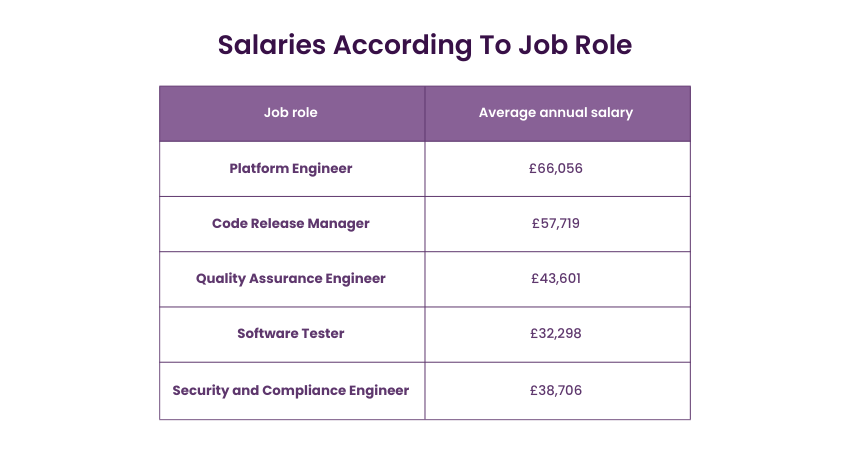
Source: Glassdoor
Platform Engineers earn £66,056 annually, focusing on designing, developing, and maintaining platforms that support software applications. They ensure the platform is scalable, secure, and efficient, enabling developers to deploy applications smoothly and reliably.
Code Release Managers have an average annual salary of £57,719. They oversee the release of software updates and new features. Their primary responsibility is managing the release process to make sure that code changes are integrated, tested, and deployed effectively. This reduces the risk of downtime or errors and ensures that updates are delivered smoothly to end-users.
Quality Assurance Engineers, earning an average of £43,601 per year, are responsible for testing software to identify and fix bugs before release. They ensure the software meets standards and functions correctly, significantly contributing to the product's overall quality and reliability. Their work helps to ensure that the end-user experience is seamless and free of major issues.
Software Testers, with an average annual salary of £32,298, perform manual and automated tests on software applications. Their goal is to ensure that applications function as intended. By resolving issues with developers, they enhance software reliability and user-friendliness, which is crucial in the final development stages.
Security and Compliance Engineers earn an average salary of £38,706 annually. They focus on maintaining the security and compliance of software systems. Their duties include implementing security measures, conducting audits, and ensuring that systems adhere to regulatory requirements. This role protects the organisation from security breaches and legal issues, ensuring software systems are secure and industry compliant.
These roles are integral to the DevOps ecosystem, each contributing uniquely to the efficient development, testing, release, and security of software applications. The salaries reflect the required skills and expertise, highlighting their value in maintaining and advancing technology within organisations.
Don’t miss out on the opportunity to shine—practice answering common Software developer interview questions to feel confident and ready for your interview.
Salary based on location
This table outlines the average annual salaries for different countries in the field of DevOps Engineer.
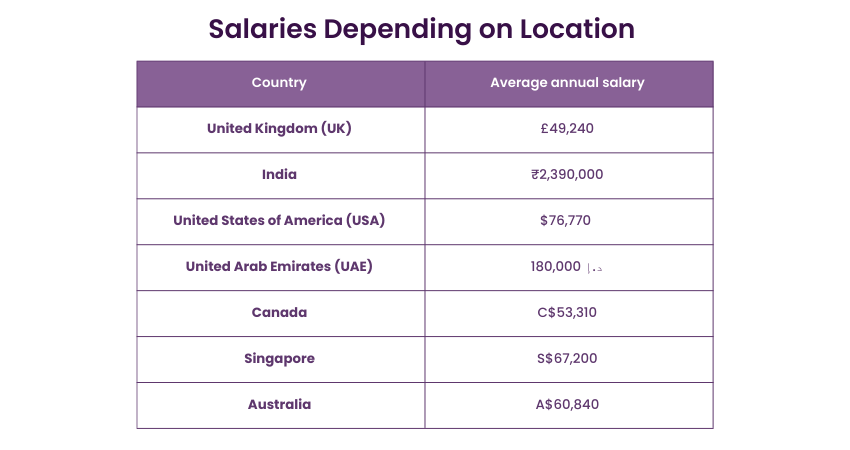
Source: Glassdoor
In the United Kingdom (UK), DevOps Engineers earn around £49,240 per year. This high salary reflects the strong demand for their skills in a competitive tech market.
In India, the average annual salary for DevOps Engineers is ₹23,90,000. While this may seem lower compared to Western countries, it is quite significant in the Indian job market, showing the growing importance of DevOps skills.
In the United States of America (USA), DevOps Engineers make about $76,770 per year. The USA's advanced tech industry values these professionals highly, offering substantial salaries for their expertise.
In the United Arab Emirates (UAE), DevOps Engineers earn approximately د.إ 180,000 annually. This high salary reflects the UAE's investment in new technologies and digital transformation.
In Canada, DevOps Engineers have an average salary of C$53,310 per year. The strong tech industry in Canada supports these competitive wages for DevOps professionals.
In Singapore, DevOps Engineers earn about S$67,200 annually. Singapore's status as a global tech hub ensures good pay for skilled professionals in this field.
In Australia, the average annual salary for DevOps Engineers is A$60,840. Australia's growing tech sector values the contributions of DevOps Engineers, offering competitive salaries.
Salary based on experience level
This table outlines the average annual salaries in GBP for different experience levels in the field of DevOps Engineering.
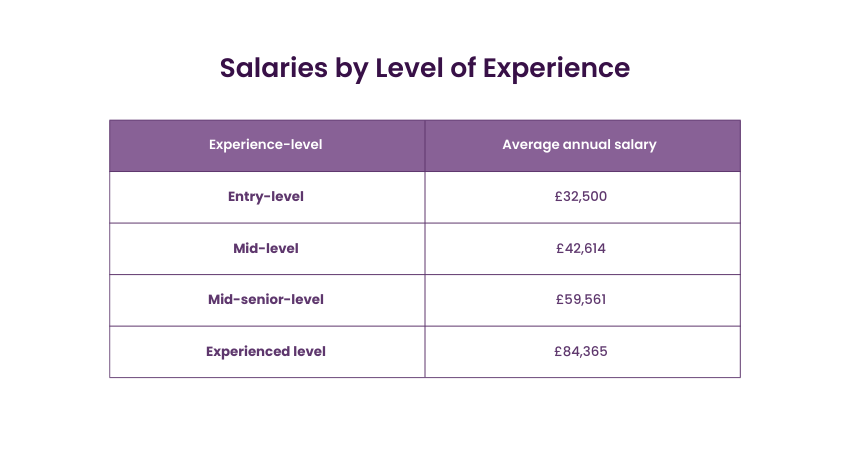
Source: Glassdoor
Entry-level: When starting out, DevOps Engineers earn around £32,500 per year. This is typical for those who are new to the field and are just beginning to build their skills.
Mid-level: After gaining some experience, DevOps Engineers can expect to earn about £42,614 annually. At this stage, they have a deeper understanding of the field and can handle more complex tasks.
Mid-senior level: With significant experience and a higher level of expertise, the salary increases to approximately £59,561 per year. These engineers often take on leadership roles and handle more advanced projects.
Experienced level: Highly experienced DevOps Engineers who have extensive knowledge and skills, can earn about £84,365 annually. They are usually involved in the most critical projects and may also mentor less experienced engineers.
Secure your future with CDSOP Certification-register with our Certified DevOps Security Professional (CDSOP) today!
Conclusion
DevOps Engineers are the linchpins of modern IT, seamlessly blending development and operations to drive efficiency and innovation. Their expertise ensures smooth software delivery and robust infrastructure. With growing demand and competitive salaries, a career in DevOps promises both challenge and reward in an ever-evolving field.
Learn to implement different types of deployments for application features in AWS. Sign up for the AWS Professional DevOps Engineer Training course now!
Frequently Asked Questions
What skills are essential for a DevOps Engineer?

A DevOps Engineer should have strong coding and scripting abilities and proficiency in CI/CD tools. They need a solid understanding of Cloud Services, expertise in automation, and knowledge of operating systems (OS).
What responsibilities does a DevOps engineer take care of?

A DevOps Engineer handles automating processes and maintaining infrastructure. They monitor system performance and manage CI/CD pipelines. Additionally, they collaborate with teams, ensure security compliance, and troubleshoot issues to ensure smooth and efficient software delivery.
What are the other resources and offers provided by The Knowledge Academy?

The Knowledge Academy takes global learning to new heights, offering over 3,000 online courses across 490+ locations in 190+ countries. This expansive reach ensures accessibility and convenience for learners worldwide.
Alongside our diverse Online Course Catalogue, encompassing 19 major categories, we go the extra mile by providing a plethora of free educational Online Resources like News updates, Blogs, videos, webinars, and interview questions. Tailoring learning experiences further, professionals can maximise value with customisable Course Bundles of TKA.
What is the Knowledge Pass, and how does it work?

The Knowledge Academy’s Knowledge Pass, a prepaid voucher, adds another layer of flexibility, allowing course bookings over a 12-month period. Join us on a journey where education knows no bounds.
What are the related courses and blogs provided by The Knowledge Academy?

The Knowledge Academy offers various DevOps Certification, including Certified DevOps Professional (CDOP), Certified Agile DevOps Professional (CADOP) and Certified DevOps Security Professional (CDSOP). These courses cater to different skill levels, providing comprehensive insights into DevOps Engineer Job Description.
Our Programming & DevOps Blogs cover a range of topics related to DevOps, offering valuable resources, best practices, and industry insights. Whether you are a beginner or looking to advance your Programming skills, The Knowledge Academy's diverse courses and informative blogs have you covered.
Upcoming Programming & DevOps Resources Batches & Dates
Date
 Certified DevOps Professional (CDOP)
Certified DevOps Professional (CDOP)
Thu 27th Mar 2025
Thu 29th May 2025
Thu 24th Jul 2025
Thu 25th Sep 2025
Thu 27th Nov 2025






 Top Rated Course
Top Rated Course



 If you wish to make any changes to your course, please
If you wish to make any changes to your course, please


